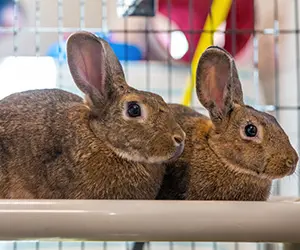ARL’s Spay Waggin’® Celebrates 80,000th Surgery
ARL partners with the YMCA of Greater Boston for special Spay Waggin’ clinic, improving the health and well-being of people and pets in our communities
Just before Christmas, the Animal Rescue League of Boston’s (ARL) Spay Waggin’ celebrated its 80,000th spay and neuter surgery during a special clinic in East Boston, in partnership with the YMCA of Greater Boston.
ARL’s mobile vehicle, the Spay Waggin’, provides low-cost, high-quality spay/neuter services, and during this special clinic, more than two dozen animals had the important surgery performed, surpassing the 80,000 mark since the Spay Waggin’ was first launched in 2000.
ARL is thrilled to have the opportunity and ability to provide this service to pet owners in East Boston as well as other Greater Boston communities, and to celebrate this occasion with the YMCA of Greater Boston.
“The Animal Rescue League of Boston is a resource for pet owners, and this is a momentous occasion for a program that is now in its 24th year of service,” said Dr. Edward Schettino, ARL President and CEO. “We are proud of our work and the collaborative efforts of human service organizations like the YMCA of Greater Boston who helped innovative ideas become reality, helping countless pet owners in Boston.”
“We are proud and honored to partner with the Animal Rescue League of Boston to mark this important milestone,” said David Shapiro, CEO Y of Greater Boston. “We were energized to host the launch of this important innovation and outreach seven years ago, and it is incredibly meaningful to play a continued supporting role in collaboratively strengthening the bond between people and their pets, improving the health and well-being of both by removing barriers so all can better thrive in community.”
ARL’s Spay Waggin’ provides spay/neuter services throughout the South Shore, South Coast, Cape Cod and the Islands, and Greater Boston.
Without this program, this vital surgery for pets would financially be out of reach for many pet owners, and the Spay Waggin’ not only provides a low-cost option, but also brings accessible services directly where they’re needed most.
Make a Difference
As the year comes to a close, you have the power to make a life-changing difference for animals in need.
Your support helps provide food, medical care, and safe shelter to vulnerable animals, giving them the care they deserve.
Donate today and help us start the new year with hope, love, and brighter futures for the animals who need us most.













